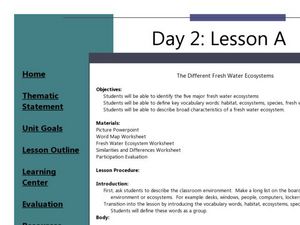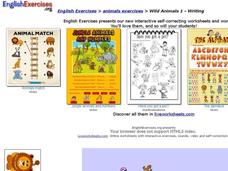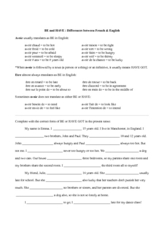Curated OER
Simple Present Tense Crossword
In this simple present crossword instructional activity, students complete a 12 word puzzle, using given clues. Words have to do with the simple present tense.
Curated OER
Ecosystem Organization - Lesson Plan
Student explore ecosystems. In this ecosystem organization instructional activity, pupils consider how scientists study living organisms. Students participate in a teacher guided activity that requires them to visualize an organism and...
Curated OER
Keeping Our Pets Safe in an Emergency
Students participate in a service learning project to benefit the members and animals in their community. In this animal welfare lesson, students review emergency preparedness. Students discuss animal safety in an emergency. Students...
Curated OER
From Polliwog to Frog
Students examine how frogs change. In this life cycle lesson, students create a model to show how a frog changes throughout its life. Students will show the process of frog metamorphosis, from polliwog to adult frog.
Curated OER
Phrasal Verbs Quiz
In this phrasal verbs learning exercise, students read the example phrasal verbs and select the correct verb form to complete the 10 online exercises.
Curated OER
The Different Fresh Water Ecosystems
Students summarize the characteristics of an ecosystem. In this biology lesson plan, students identify five major fresh water ecosystem. They define terms and write a journal about what they learned.
Curated OER
ESL Vocabulary-Animals
In this ESL vocabulary worksheet, students study a chart of pictures and animal names, then unscramble names, watch a video and list animals seen, fill in missing letters, complete an animal crossword and classify given animals.
Curated OER
Kindergarten Kids: What Is It? - Animals
In this naming animals worksheet, students look at picture of animals and choose their correct name from a drop down list, then do the same to answer what the animals are doing.
Curated OER
There Is/There Are
In this preposition learning exercise, students focus on the differences of "there is" vs "there are." Students complete 12 sentences checking the correct verb form for each phrase.
Curated OER
Breaking News English: Londoners Offered BLT for SAD
In this English worksheet, students read "Londoners Offered BLT for SAD," and then respond to 47 fill in the blank, 7 short answer, 20 matching, and 8 true or false questions about the selection.
Curated OER
Describing Environments
Fifth graders describe environments using position words. In this description lesson, 5th graders practice using adjective, comparatives and superlatives in partners and on worksheets.
Curated OER
Cool Math
Young scholars benefit from the correctly selected book for a specific math concept. In this book selection lesson, students are given a list of books related to specific math concepts. Young scholars' ages can range from pre-school to...
Curated OER
Introduce Vocabulary: Sorting
Learners explore language arts by reading a children's book in class. In this tier two vocabulary lesson, students read the book Sorting and identify the use of specific vocabulary words. Learners define selected vocabulary terms and...
Curated OER
Poetic Devices
In this figurative language worksheet, students read and study examples of simile and metaphor. There are 20 questions to be used with Smartboard and 10 questions in which students identify similes or metaphors.
Curated OER
Be and Have: Differences between French and English
In this be/have worksheet, students read about the differences between the 2 words in English and French, then fill in blanks in a paragraph with the correct form of "be" or "have got" in present tense.
Other popular searches
- Cats and Dogs
- Dogs and Cats Compare
- Comparing Cats and Dogs
- African Dogs and Cats
- Dogs and Cats Comprehension
- Cats Dogs
- Cats Dogs Cat Dog
















